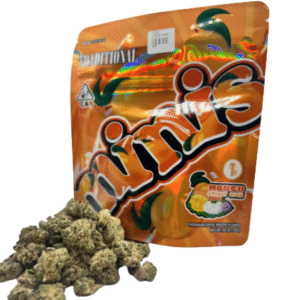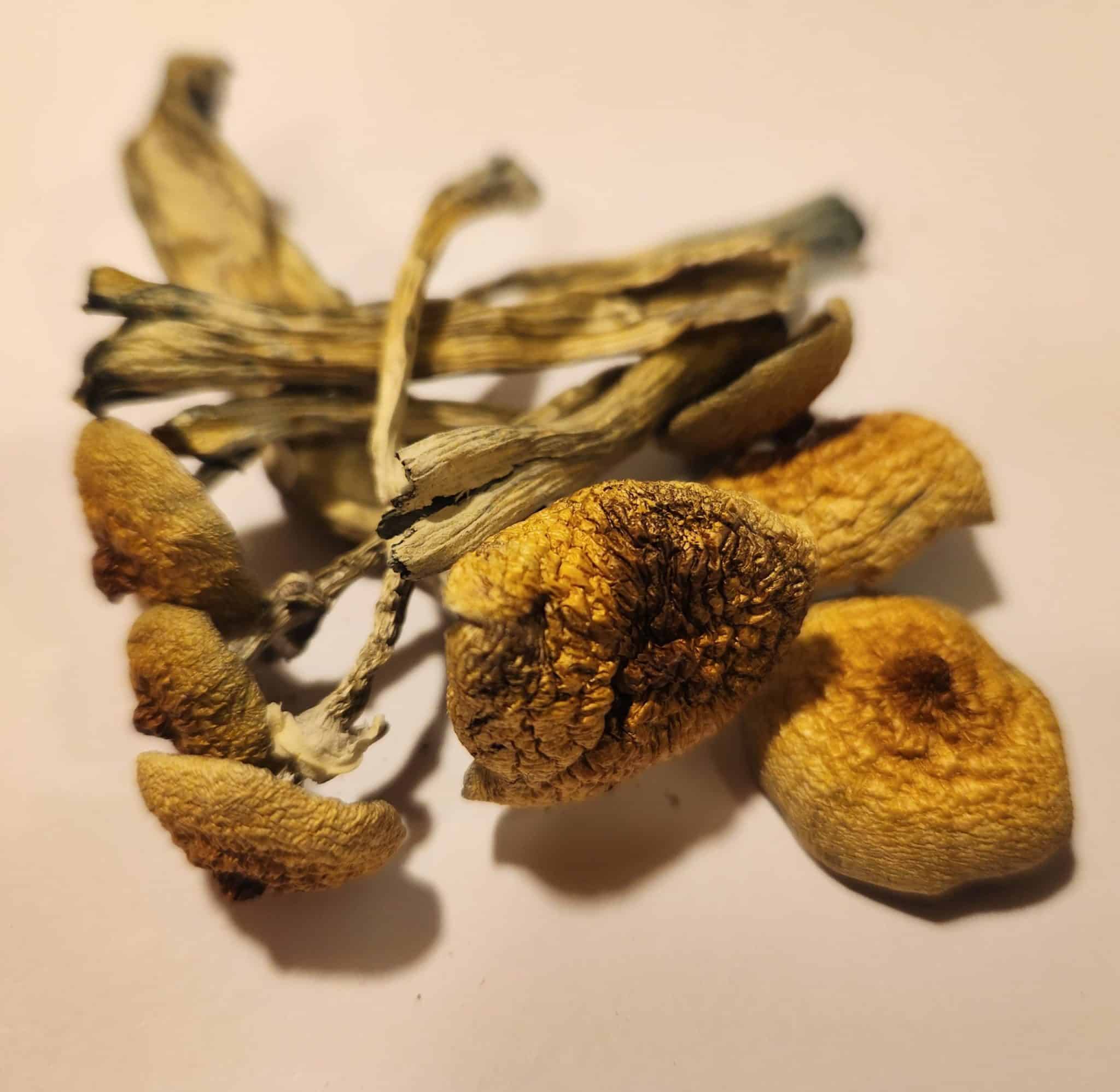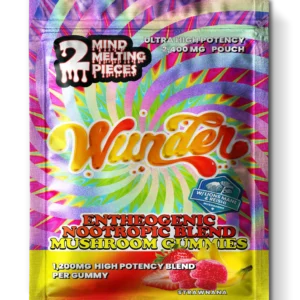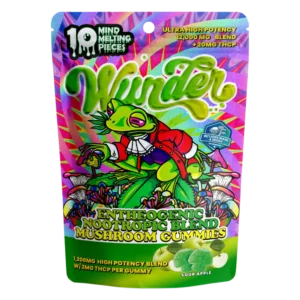The Legacy of Golden Teacher
Golden Teacher Mushrooms have long been a focal point in the world of psychedelics. Known for their distinctive golden caps and wise, “teacher-like” effects, they have earned a reputation not only as a tool for self-exploration but also as an object of reverence in various cultural and spiritual contexts. The name “Golden Teacher” reflects the mushroom’s reputed ability to impart life lessons, foster creative insights, and provide a gateway to enhanced self-awareness.
Golden Teacher stands out due to its balanced psychoactive properties. It is often described as offering both uplifting, euphoric sensations and a deep, introspective journey that encourages users to reflect on personal challenges and spiritual questions. Researchers and psychonauts alike appreciate its moderate potency, which makes it a popular choice for both first-time and experienced users.
For more detailed information on psilocybin research and historical usage, visit the Multidisciplinary Association for Psychedelic Studies (MAPS) and Erowid’s Psilocybin Mushroom Vault.
Taxonomy and Botanical Characteristics
Classification and Identification
Golden Teacher belongs to the genus Psilocybe, which is known for containing species with hallucinogenic properties due to the presence of psilocybin and psilocin. While taxonomic classification in psychedelic mushrooms can be complex and subject to revision, Golden Teacher is typically categorized as follows:
- Kingdom: Fungi
- Division: Basidiomycota
- Class: Agaricomycetes
- Order: Agaricales
- Family: Hymenogastraceae
- Genus: Psilocybe
- Species: Often identified as Psilocybe cubensis (with Golden Teacher as a popular variant or strain)
The golden-hued cap, which gives the strain its name, is usually convex to broadly convex in shape and may develop a slight umbonate feature as it matures. The cap’s coloration can range from a rich golden to a more tawny hue, with a smooth, sometimes sticky surface when fresh. The stem is typically long and slender, with a white to slightly off-white color, often bruising blue when handled—a characteristic marker of psilocybin-containing mushrooms.
For an in-depth look at the taxonomy of psilocybin mushrooms, check out Fungi Magazine and the North American Mycological Association.
Natural Habitat and Cultivation
Ecological Niche and Distribution
Golden Teacher Mushrooms are naturally found in subtropical and tropical environments, thriving in environments rich in organic matter. They commonly grow on cow dung or in nutrient-rich soils in pasture lands, often in regions with warm and humid climates. Their natural distribution spans parts of Latin America, Southeast Asia, and other regions where environmental conditions are optimal for fungal growth.
- Substrate and Soil Conditions:
Golden Teacher typically colonizes substrates that are high in organic content, including manure and decaying plant material. The nutrient-rich environment supports rapid mycelial growth, culminating in the fruiting bodies that are collected for their psychoactive properties. - Seasonality:
In the wild, these mushrooms tend to fruit during the rainy season when humidity and temperature are favorable for mushroom development. This seasonal pattern contributes to their traditional harvesting methods and underscores the importance of environmental cycles in fungal ecology.
For further reading on mushroom ecology and natural cultivation practices, visit The Mushroom Council and MycoWeb.
Cultivation Practices
Due to increasing interest and the demand for consistent quality, Golden Teacher Mushrooms are now widely cultivated. Controlled indoor and outdoor cultivation methods allow growers to standardize the growing environment, thereby producing mushrooms with reliable potency and appearance. Key aspects of cultivation include:
- Substrate Preparation:
Cultivators often use sterilized substrates such as rice flour, vermiculite, and manure to create optimal conditions for mycelium development. - Environmental Control:
Maintaining precise temperature and humidity levels is crucial. Most indoor cultivators aim for temperatures between 75°F to 80°F (24°C to 27°C) during colonization and slightly lower during fruiting. - Harvesting and Post-Harvest Handling:
Mushrooms are typically harvested when the cap begins to flatten and the veil shows signs of breaking. Proper drying techniques are used to preserve psilocybin content and extend shelf life.
These controlled cultivation methods not only improve product quality but also ensure sustainable production practices. For cultivation tips and best practices, see Shroomery’s cultivation forum and Psilocybin.info.
Chemical Composition and Psychoactive Properties
Key Psychoactive Compounds
Golden Teacher Mushrooms owe their psychoactive effects primarily to two compounds: psilocybin and psilocin. Upon ingestion, psilocybin is metabolized into psilocin, which is responsible for binding to serotonin receptors in the brain and triggering the psychedelic experience.
- Psilocybin:
A prodrug that is converted into psilocin in the body. Its stability and potency have made it the subject of extensive pharmacological research. - Psilocin:
The active compound that interacts with the brain’s serotonin receptors, particularly the 5-HT2A receptor. This interaction leads to alterations in perception, mood, and thought.
Additional Bioactive Components
Besides the primary psychoactives, Golden Teacher contains various other compounds that may contribute to its overall effect profile and potential therapeutic benefits. These include:
- Beta-Carbolines:
Naturally occurring alkaloids that may modulate the overall intensity of the psychedelic experience. - Tryptamines:
Compounds structurally related to serotonin, which could play a role in mood regulation. - Antioxidants and Polysaccharides:
Emerging research suggests that mushrooms also contain antioxidants and beta-glucans that might support immune health and reduce inflammation.
For more scientific insights on psilocybin chemistry, review studies available on PubMed and articles by MAPS.
The Psychedelic Experience: Effects and Dosage
Subjective Effects
Golden Teacher is renowned for offering a balanced and introspective psychedelic experience. Users frequently report a blend of euphoria, vivid visual imagery, and deep philosophical insights. The effects can vary widely based on individual physiology, set (mindset), and setting (environment), but several common themes emerge:
- Euphoric Uplift:
A feeling of bliss and emotional openness that can elevate mood and encourage social interactions. - Enhanced Perception:
Visual alterations, including enhanced colors, geometric patterns, and a sense of fluid motion in the environment. - Introspective Insights:
Many users experience a reflective state that can lead to personal insights, creative breakthroughs, and a reevaluation of life priorities. - Spiritual and Mystical Experiences:
Some individuals report profound experiences that border on the mystical, including feelings of unity with the universe and a deep sense of inner peace.
Dosage Guidelines
Determining the right dosage is critical for achieving a desirable experience while minimizing adverse effects. Dosage can be categorized broadly as follows:
- Microdose:
Typically around 0.1 to 0.3 grams of dried mushroom material, aimed at subtle cognitive enhancement and mood elevation without significant perceptual alterations. - Moderate Dose:
Ranges from 1 to 2.5 grams, which is popular for introspection, creativity, and mild to moderate perceptual changes. - High Dose:
Generally 3 grams or more, reserved for those with experience seeking a full-blown psychedelic journey that can result in significant alterations in perception and ego dissolution.
It is essential to approach dosage cautiously, especially for beginners. The effects of psilocybin can be profound, and setting a safe, controlled environment is paramount. For additional dosing information and user experiences, consult Erowid’s dosage guidelines and Shroomery’s experience reports.
Therapeutic and Medicinal Potential
Mental Health Applications
Recent research has reignited interest in the therapeutic applications of psilocybin, particularly for mental health conditions. Golden Teacher, as a widely used strain, has been studied for its potential to help in:
- Depression and Anxiety:
Clinical trials have demonstrated that psilocybin-assisted therapy can lead to significant reductions in depressive symptoms and anxiety, with lasting benefits after only a few sessions. - Post-Traumatic Stress Disorder (PTSD):
Preliminary studies suggest that psilocybin may help individuals process traumatic memories and reduce symptoms of PTSD through its ability to facilitate emotional release and cognitive restructuring. - Addiction Treatment:
There is emerging evidence that psilocybin can assist in treating substance abuse disorders by disrupting entrenched behavioral patterns and providing new insights into personal habits.
Neuroplasticity and Cognitive Enhancement
Psilocybin’s ability to promote neuroplasticity—the brain’s capacity to form new neural connections—has also drawn attention. Users have reported enhanced creativity and improved problem-solving abilities following controlled psilocybin sessions. These cognitive benefits may offer long-term advantages, such as better emotional regulation and resilience.
For more detailed research on psilocybin’s therapeutic potential, refer to articles on MAPS Research and reviews available through PubMed Central.
Cultural Impact and Spiritual Significance
Historical Context
Golden Teacher and other psilocybin mushrooms have played an integral role in indigenous spiritual practices for centuries. Indigenous cultures in Mesoamerica, for example, have used mushrooms ceremonially to connect with the divine, seek guidance, and heal emotional or physical ailments. The teachings and symbolism associated with these mushrooms are rich in allegory and often evoke themes of transformation, rebirth, and unity with nature.
Modern Psychedelic Renaissance
In recent decades, a modern psychedelic renaissance has brought Golden Teacher back into the limelight. As legal restrictions loosen and research becomes more robust, these mushrooms have reemerged as tools for self-exploration and healing. Contemporary users often describe their experiences with Golden Teacher as life-changing, providing clarity on personal issues and inspiring creative expression. The narrative around these mushrooms is shifting from one of recreational use to one of profound personal and collective transformation.
For more perspectives on the cultural and spiritual significance of psilocybin, visit The Psychedelic Experience and explore Erowid’s cultural archives.
Culinary and Supplement Applications
While Golden Teacher is primarily known for its psychedelic properties, innovative approaches to its use have emerged. In some regions where psilocybin is decriminalized or allowed for research, enthusiasts are exploring ways to incorporate controlled doses into edible formats. These may include teas, chocolates, and even nutrient supplements designed for microdosing protocols. Such innovations aim to harness the cognitive and emotional benefits of psilocybin in a convenient, palatable format without the intense visuals or introspection associated with higher doses.
Edible applications often involve careful extraction and infusion processes to ensure that the active compounds remain stable and effective. These culinary innovations are paving the way for a broader acceptance of psilocybin as a functional ingredient in both wellness and gastronomy.
Safety, Legal, and Ethical Considerations
Safe Consumption Practices
Given the potent nature of psilocybin, responsible use is paramount. Here are some key safety practices to observe when using Golden Teacher Mushrooms:
- Set and Setting:
Always ensure you are in a safe, comfortable environment and that you have a trusted friend or guide present if possible. - Start Low:
For newcomers, begin with a microdose or a lower dosage to gauge personal sensitivity before increasing the dose. - Integration:
After the experience, take time for reflection, journaling, or discussion with a supportive community or professional to integrate insights and lessons. - Avoid Mixing:
Do not combine psilocybin with other psychoactive substances, including alcohol, to avoid unpredictable interactions.
Legal Status
The legal status of psilocybin mushrooms, including Golden Teacher, varies by country and region. In some areas, these mushrooms remain a controlled substance, while in others, decriminalization or regulated therapeutic use is emerging. It is essential to stay informed about local laws and regulations regarding possession, cultivation, and consumption. For current legal information, refer to resources like NORML and Erowid’s legal section.
Ethical Considerations
Ethical use of psilocybin mushrooms includes respecting both the cultural heritage associated with these substances and the legal frameworks governing their use. As research and acceptance grow, it is important for users and practitioners to promote responsible, informed, and respectful practices that honor indigenous traditions and contemporary scientific inquiry.
Quality Assurance and Sourcing
Golden Teacher Mushrooms available through reputable suppliers are cultivated under strict quality control measures. These include:
- Third-Party Lab Testing:
Reliable vendors provide lab test results that verify psilocybin content and ensure the absence of contaminants. QR codes on packaging may offer direct access to these results. - Sustainable Cultivation:
Many growers now focus on sustainable and organic cultivation practices that respect both the environment and traditional methods. - Transparency:
Ethical suppliers provide clear information regarding cultivation, harvesting, and processing methods to ensure consumers can make informed choices.
For further details on quality standards in psychedelic products, consider resources such as MAPS and The Beckley Foundation.
Consumer Experiences and Testimonials
Over the years, Golden Teacher Mushrooms have accumulated a wealth of anecdotal reports and testimonials. Many users describe their experiences as transformative, highlighting benefits such as increased self-awareness, enhanced creativity, and a renewed sense of connection to the world around them. Some common themes in user testimonials include:
- Emotional Healing:
Reports of overcoming long-held emotional blocks and gaining clarity about personal relationships. - Spiritual Insights:
Experiences of mystical or transcendental states that lead to profound spiritual realizations. - Cognitive Enhancement:
Improved problem-solving, creativity, and an overall uplift in mood and motivation after a moderate dose.
These testimonials, while subjective, contribute to the growing body of evidence that supports the safe and effective use of Golden Teacher Mushrooms in both therapeutic and recreational contexts.
The Enduring Wisdom of Golden Teacher
Golden Teacher Mushrooms continue to captivate and inspire across generations and cultures. Their unique blend of gentle, introspective psychoactivity and vibrant visual and emotional effects has cemented their status as one of the most accessible and enlightening forms of psilocybin available. Whether used as a catalyst for personal growth, creative exploration, or spiritual awakening, Golden Teacher offers a window into the profound interplay between nature and consciousness.
In summary, Golden Teacher Mushrooms encapsulate a legacy of mystery, wisdom, and transformation. Their distinctive appearance, balanced effects, and rich cultural history make them a cherished tool in the exploration of the human mind and spirit. As modern research advances and societal attitudes toward psychedelics continue to evolve, Golden Teacher remains a beacon of the potential benefits that natural substances can offer when used responsibly and with respect.
For anyone interested in exploring the world of psilocybin mushrooms—whether as a pathway to personal insight or as part of a broader therapeutic regimen—Golden Teacher stands as a symbol of nature’s enduring wisdom. Embrace the journey with care, curiosity, and respect for the power that lies within these ancient organisms.
For additional insights and ongoing research into psilocybin and its applications, visit MAPS, Erowid, and PubMed Central.

 Mambasita | 7 Grams – STIIIZY Premium Cannabis Flower
Mambasita | 7 Grams – STIIIZY Premium Cannabis Flower  Mango Sticky Rice | 5 Grams – STIIIZY Premium Cannabis Flower
Mango Sticky Rice | 5 Grams – STIIIZY Premium Cannabis Flower  3Chi Delta-10-THC Vape Cartridge – Snowman
3Chi Delta-10-THC Vape Cartridge – Snowman 



